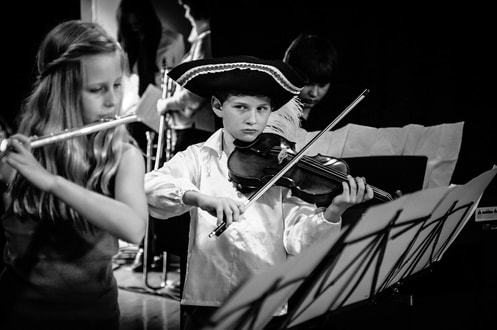|
Experts point out that nothing encourages children to love reading more than when a parent sets the example. Children who see the adults in their lives taking time to read for pleasure are more likely to become enthusiastic readers themselves. So why not do the same thing for classical music? One way to start children off with a love of music is to model exactly what that looks like: Play musical games together, dance and sing as part of regular family activities, attend concerts, and enjoy recordings of great music together. But how can a parent demonstrate a love for classical music if he or she hasn’t had the opportunity to develop a taste for it? Fortunately, a number of popular books—all written for interested adult laypeople by experts in the field—are available. The following list represents a sampling of fascinating books that can inspire a love of serious music while providing an enjoyable, educational read. 1. Experience the wonderYear of Wonder: Classical Music to Enjoy Day by Day by Clemency Burton-Hill offers simple, one-page summaries—each tied to a specific day of the calendar year—of the delights to be found in 365 different pieces of music. The 2018 book, published by Harper, brings this expert musicologist and media personality’s extensive knowledge of the subject within easy reach of anyone who has time to read one page each day. The book offers a fun way to browse through Burton-Hill’s carefully curated selections as she provides fascinating snippets of information about each work, its composer, and its historical context. While it makes a delightful browsing book, Year of Wonder can also be used as a personal tutor through a year of discoveries in classical music. Readers can look for online or hard-copy recordings of each work, making for an enriching multimedia listening and learning experience. 2. Glimpse fascinating livesThe Indispensable Composers: A Personal Guide, written by Anthony Tommasini and published by Penguin Press, is another 2018 title that provides a wide-ranging journey through the history of great music and exactly how its creators made it. Tommasini serves as the New York Times’ head music critic, and his encyclopedic knowledge of his subject is on vivid display in this book. His assessment of each composer is easy-to-understand, free of jargon, and completely accessible, and is often accompanied by fascinating anecdotes and discussions of other cultural figures and of the author’s personal experiences in the world of music. Even those who are unfamiliar with the ways in which, for example, Beethoven’s concertos or Arnold Schoenberg’s twelve-tone technique revolutionized music will be able to grasp the significance of these and other big moments in the history of the classical music genre. 3. Catch the enthusiasmA Mad Love: An Introduction to Opera by Vivien Schweitzer, published in 2018 by Basic Books, brings the world of opera down to earth for even the most skeptical contemporary reader. Schweitzer, a former New York Times opera and music critic and pianist, offers readers a vivid romp through opera’s history and development, checking in on the most noted composers, performers, and performances along the way. This lively book should dispel any stereotypes about opera being dull or beyond the comprehension of everyday people. Schweitzer ranges from the first opera known to have been composed—the early 17th century L’Orfeo by Claudio Monteverdi—through great Romantic era pieces like Carmen by Georges Bizet to contemporary works by composers like Philip Glass. The author provides us with riveting stories of the high—and low—moments in opera’s dramatic history, including the initial hostility of audiences toward Gioachino Rossini’s now-classic The Barber of Seville, and the rising and falling critical reputations of composers such as the near-contemporaries Richard Wagner and Giuseppe Verdi, bringing considerable wit and humor to the task. 4. Take a tour with an iconic guideIn 1984, beloved radio personality Karl Haas published Inside Music: How to Understand, Listen to, and Enjoy Good Music. Haas, who died in 2005 at age 91, had become an informal instructor in classical music for people all over the world through his program called Adventures in Good Music, broadcast by numerous public radio stations. Inside Music brings Haas’ distinctive blend of erudition and lively, pun-filled sense of humor to the fore, providing a friendly guided tour through the history and composition of great works. The book has been through multiple editions and remains in print under the Anchor imprint. Generations of readers have found it an indispensable first survey of its subject. 5. Enjoy a master classThe Lives of the Great Composers by Harold Schonberg, originally published in 1970, is another older classic widely read and loved by amateur and professional students of music alike. Still available in an updated edition published by W. W. Norton & Company, the book offers detailed but easily digestible biographical portraits of composers from the Baroque era to the minimalists, tonalists, and experimentalists of the 20th century.
The author additionally covers the lives and contributions of female composers such as Fanny Mendelssohn Hensel, the sister of Felix Mendelssohn. This makes a welcome addition to our expanding knowledge of composers who have remained underappreciated for generations due to their gender. Schonberg, who died in 2003, was another New York Times music critic, and the first person ever to earn a Pulitzer Prize for music criticism. Comments are closed.
|
Photo used under Creative Commons from Marina K Caprara

 RSS Feed
RSS Feed
